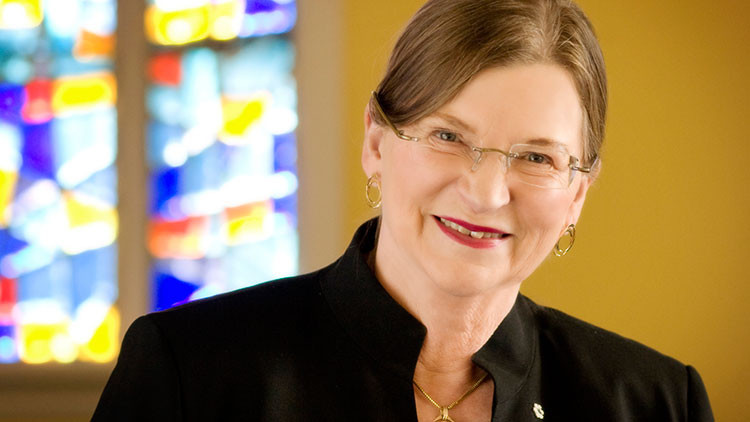Government mail service may be affected by the Canada Post labour disruption. Learn about how critical government mail will be handled.

"Take each day as it comes and try to do the best you can…you never know what challenges are on the horizon.”""Good palliative care is a combination of being in the moment, being a good listener and never making judgments about what the patient wants or needs."
Helen Hays is a medical pioneer who is widely respected for her compassionate work with people facing chronic pain and terminal illness. Alberta’s palliative care programs today are the result of her innovation, her deep understanding of the needs of her patients and her tireless service as mentor to her fellow health care providers.
She was born Helen Hagenbach in Townsend, a small hamlet in Cornwall, England. In some respects, Helen’s childhood experiences shaped the physician she was to become. Her mother, Dorothy, died of meningitis when Helen was just six years old. Although she and her older brother, Paul, were shielded from much of their mother’s illness, the loss engendered in Helen a deep compassion for other people’s suffering.
Her father was Charles Hagenbach, a general practitioner who gave his children an initiation into the life of a country doctor by taking them along on house calls. The trips were always a highlight for young Helen, during her years in Cornwall and later when her father remarried and moved the family to Somerset. The experience of seeing her father’s great dedication to, and compassion for, his patients provided Helen with an ideal model to follow.
Helen excelled at school and dreamed of becoming a physician. However, the career posed considerable obstacles for women at the time so she chose to train as a nurse. Helen graduated from St. George’s Hospital in London in 1954 and went on to become a State Certified Midwife. She then began completing requirements for a Bachelor of Medicine degree. Along the way, she met and married Peter Hays who was a registrar (resident) at St. George’s Hospital where she worked. Helen’s medical studies were put on hold for a time.
In 1967, the University of Alberta was in the midst of an international recruiting drive for its faculty of medicine. Helen and Peter embraced the increased opportunities and adventure that immigrating to Canada offered. The U of A’s Dean of Medicine, Walter C. Mackenzie, encouraged Helen to finish the degree she began in London and, in 1971, Helen Hays fulfilled her dream of becoming a doctor.
Dr. Hays carefully balanced the demands of school and starting her career with her cherished role as mother to their five children: Peter, Rosie, Matthew, James and Fleur. She opened a family practice in south Edmonton that covered everything from pediatrics to geriatrics and included a steadfast commitment to providing house calls when needed. In fact, her life in private practice might have encompassed her entire career had she not encountered one patient in particular.
Helen was moved by a young mother with terminal leukemia who wanted to live as long as possible for her newborn son. Near the end, the patient began to experience a great deal of pain and suffering, which didn’t correspond to what Helen had learned about the disease in medical school. She set out to learn more about complicated pain management and to identify ways to enhance quality of life for patients facing terminal illness.
In 1982, Dr. Hays was recruited to create the first Palliative Care Unit at the Edmonton General Hospital. For the next seven years, she experienced a steep learning curve in what was then a very new specialization. In addition to training herself in palliative care and developing her own pioneering approaches, Dr. Hays was successful in promoting training for all physicians. She instituted a program of groundbreaking forums and workshops that would take her to virtually every town and city in Alberta and many points beyond. Although the public speaking was taxing on her naturally introverted nature, the sessions were an invaluable resource for countless physicians and their patients. Helen also began mentoring Alberta physicians through her appointment as an Associate Clinical Professor at the University of Alberta.
The late 1980’s brought two major changes for Helen - a return to single life and new challenges as Medical Director of Palliative Care Services at the Edmonton Misericordia Hospital. Dr. Hays joined the Misericordia in 1988 and introduced a decidedly holistic approach to palliative care, with a focus on creating multi-disciplinary teams of doctors, social workers, chaplains, home care workers and other specialists required to meet the unique needs of each patient.
Although this new approach allowed for a greater number of patients to die with the peace and dignity they desired, Helen found that some people seeking less clinical care settings were still falling through the cracks. In 1994, she co-founded Edmonton’s Pilgrims Hospice Society to deliver enhanced home care and outpatient services for terminally ill patients.
Around this time, Dr Hays returned to private practice and increased her focus on research designed to alleviate the suffering of people living with chronic pain. Among her many significant findings, are a ground-breaking paper that allowed chronic patients to be taken entirely off pain medication and the world’s first evidence of the cardio toxic effects of the drug Methadone.
Dr. Hays is a member of the Order of Canada and an Officer in the Companionate of Merit of the Military and Hospitaller Order of Saint Lazarus of Jerusalem. She was named an Edmontonian of the Century during the city’s centennial and is a life member of the College of Family Physicians of Canada. Other recognitions include the Alberta Centennial Medal, the Queen’s Golden Jubilee Medal, a Lifetime Achievement Award from the Canadian Pain Society and the Jean Harris Award from Rotary International.
Dr. Hays retired from active practice in December 2007 to devote more time to her children and grandchildren and to her work with the Pilgrims Hospice. That work is the culmination of a career spent in humble service of those most in need of care and compassion - a career that will serve as influence and inspiration for generations of Canadian caregivers to come.
